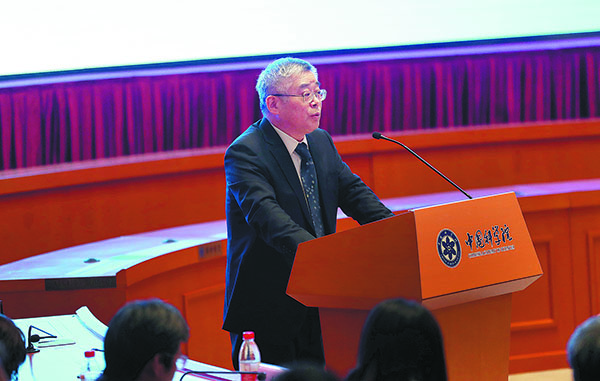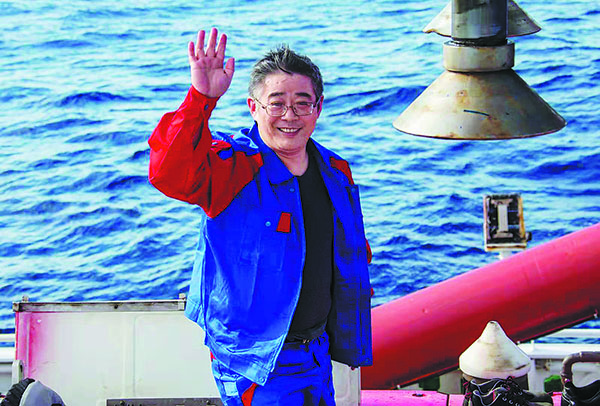

Professor Jian Zhimin, who was elected academician of the Chinese Academy of Sciences this year, is dean of the School of Ocean and Earth Science at Tongji University. He believed that oceans offer clues on global climate change patterns and the causes behind natural disasters.
"The ocean is the largest reservoir of heat in the Earth's climate system and one of the primary factors determining climate change," Jian said. "Since the Industrial Revolution, the greenhouse effect caused by carbon dioxide emissions has led to global warming, with about 93 percent of the excess heat entering the ocean. This has affected ocean heat content and subsequently influenced the ocean-continent hydrological cycle."
Using modern observations and proxy indicators from ancient environments, Jian's team has reconstructed the variations in upper ocean heat content in the warm pool over the past 360,000 years. They discovered that increased surface water evaporation in the warm pool region leads to an increase in monsoon rainfall in adjacent land areas. This is the first time that the driving role of lowlatitude ocean processes in climate change has been explained from an energy perspective. In October last year, the research study, titled "Warm pool ocean heat content regulates ocean-continent moisture transport", was published in the prestigious academic journal Nature.
Jian said, "Only with firsthand materials, firsthand data, along with innovative and open-minded thinking, can we make significant scientific contributions." He believed that conducting marine operations and combining them with terrestrial investigations by geologists was necessary to obtain the samples required for research.
Over the past 30 years, Jian has been part of numerous field investigations conducted in the South China Sea, Pacific and Indian Oceans, aboard international scientific research vessels. In 1994, he joined a Sino-German joint expedition aboard the research vessel Sonne-95 for a South China Sea survey. In 1997, he joined French research vessel Marie Tharp for the third expedition of the International Marine Global Change Study in the western Pacific Ocean and the South China Sea. In 1999, he became the first Chinese scientist to board a scientific drilling vessel for the first Ocean Drilling Program Leg 184 in the South China Sea.
"I can do research in the deep seas for up to two months, and I really enjoy being on research vessels," Jian said. "It is the fascinating world of oceans that keeps me exploring, and the joy comes from the process of transitioning from the unknown to the known."

Having received his "training" on research vessels, Jian said he always looks for occasions to send students on such research expeditions, letting them have close contact with other academicians and participate in cutting-edge scientific research.
Jian believed that just like Charles Darwin's theory of evolution in the 19th century and the plate tectonics theory in the 20th century, Earth system science will lead the transformation of Earth science in the 21st century.
"To establish a Chinese school of Earth system science, innovation is crucial. It requires not only the integration of science and technology but also creating fertile ground for an innovative culture," he said. "Modern science originated from Europe's maritime civilization, while Chinese civilization has primarily been a continental one. So we need a more adventurous and exploratory spirit. Through efforts in recent years, Chinese scientists have made breakthroughs in various aspects of Earth system science." He said that China should not only absorb the innovative advantages of maritime civilizations but also promote the strengths of Chinese civilization, uphold cultural self-confidence, and implement an innovation-driven development strategy.
In 2020, Jian was elected co-chair of the Scientific Steering Committee of the Past Global Change Programme, becoming the first non-Western scientist to hold this position in the 30-year history of PAGES. In November, when the Chinese Academy of Sciences announced the results of the 2023 election of academicians, Jian's name was on the list, giving him the highest academic title in the field of science and technology in China.
He said that being elected an academician was like a new starting point for him. "As my mentor said, the work he is proud of internationally was accomplished after he was elected an academician. As a new-generation academician, I will take up the baton and contribute more to making China a power in the field of maritime science and technology. I feel that the responsibility on my shoulders is greater than before," he said.
"To build a maritime power and venture into the world's oceans, China needs a continuous stream of talented marine geologists. Fortunately, I have a large number of outstanding young talents behind me who have made a name for themselves internationally," Jian said. "For young students, the most important thing is perseverance. You need to keep in mind what you want to do and what kind of person you want to become," Jian said. He added that young people should be willing to endure hardship, work hard, never forget their original intentions, and stay true to their aspirations.
Luo Jiayuan contributed to this story.